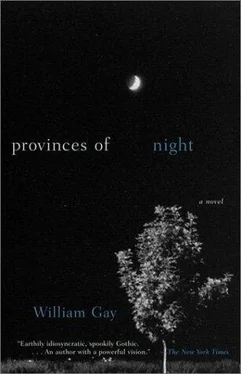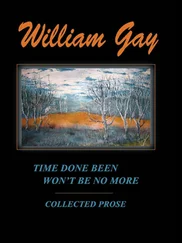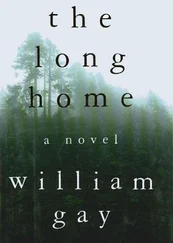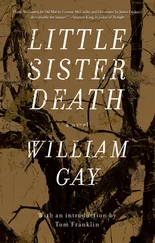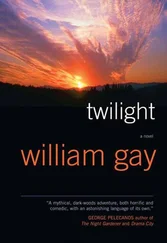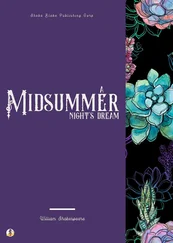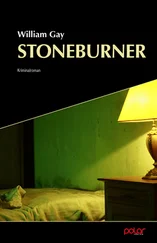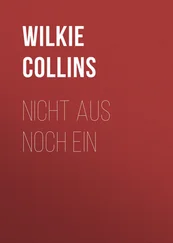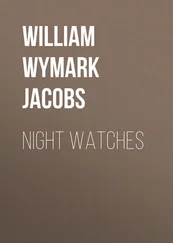In the house he lit the lamp but was too tired to eat and too tired to build a fire and he stripped off his sodden clothes and put on dry ones and fell into bed. He’d thought he’d known before what exhaustion was but he’d been mistaken. He was immediately in a dreamless slumber but woke sometime far into the night at what he thought was some sudden sound but what woke him was silence. The rain had stopped.
The next morning the first thing he noticed was that he was warm. He got up and went into the front room and saw that Boyd had already been up and about. There was a fire in the heater and the room was filled with the strong evocative odor of coffee and chicory. He did not see Boyd anywhere.
He took a cup from the cooktable and filled it from the coffee pot on the stove and went outside. It had cleared in the night and the sun was bright though it was still very cold. A steely rime of frost lay upon everything. He didn’t see Boyd and he went back into the house.
The first thing he saw was a note taped to the mirror by the window. Now what the hell is this, he thought. He took down and unfolded the sheet of foolscap.
I have gone to get your mama. From what I can learn she is in Detroit Michigan with that peddler. I hate about taking the money but it is all I can do and I’ve got to have it. I will send it back when I get work. I will be back soon but till I do you go over to Ma’s and stay there. I mean stay there.
He stood holding the note for a time with no look at all on his face. Then he crossed to the heater and opened the door. He balled the note up and threw it into the flames.

WHERE THE WOODS ended abruptly the field began, so that Fleming Bloodworth stepped from a thick viney undergrowth awash with birdsong into an open meadow lazy in the sun, cows grazing placidly below him, the new grass shading the rolling slopes with the palest of green. Tilting blackbirds burnished by the noon sun gleamed like contrivances of tinfoil, somewhere behind him a dove began to call, soft and mournful as something lost.
He sat for a time on the splitrail fence that bound the pasture, idly watching the house and its attendant buildings sleeping this warm day away. A great gothic farmhouse, of whitewashed lumber, its steep green roofline and gables like something moved intact from New England, its windows curtained and shuttered like drowsing eyes. He waited patiently to see what life would show itself. Some of Brady’s dogs milling below the kennel, a wild motley of strange dogs of no exact color and no determinate breed, perhaps some breed Brady had invented. Or invoked from the mismatched parts of other dogs, he thought, raised like Lazarus from roadkill dogs by the dark alchemy he boasted of. Fleming smiled to himself, in no hurry, feeling the sun on his shoulders, postponing the moment when he must rise and make his way down to his grandmother’s house.
Suddenly the screen door of the house opened and his grandmother came onto the porch with a broom, tiny, silent, furiously animate. She lit into one of the dogs with the broom and he could hear its startled yelp, see it scrambling madly for the gate down the doorstep. The gate must have been latched, for it finally scrambled over the porch railing and went streaking for the kennel. He didn’t see Brady about but he judged him somewhere around the place, for he could see the sun hammering off Brady’s black Buick, turtlebacked and gleaming, parked beneath the huge pine tree that shadowed the house.
He rose, in no haste, and ambled down the slope, letting the day sink into his pores as he went, cataloging the smells and sensations. The warm weight of the sun on his back on what might have been the first day of summer. The citrusy smell of the pine woods, the raw loamy earth smell of a field turned darkly to the sun by Brady’s tractor, the faint call of distant crows that was all there was to break the silence.
He came up past the kennel in a wild cacophony of noise, the dogs yelping and throwing themselves in a frenzy against the heavy wire netting stapled to the two-by-four studding. Unconfined dogs milled about him and he kept turning to kick them away savagely and to watch his back. Some of them would bite and some of them wouldn’t but he had never gotten it straight which were which. The dogs shifted about his feet like dirty water, a tide of dogs that bore him past the pear orchard and the grape arbor with its knotted armsize vines and crested at the kitchen doorstep.
The old woman had come onto the back porch to ascertain who’d authored this bedlam and stood watching him with her hand raised to shade her eyes from the sun. She fixed Fleming with a look of mock ferocity.
You get yourself in this house, she said.
He went through the back door into the long narrow kitchen, feeling as he always did the sudden onslaught of time, enthralled by the myriad smells of the kitchen: coffee and cloves and cinnamon, the heavy fruity odor of basketed apples and the faintly sour smell of dried peaches, and some other odor, rich and dark and mysterious, that was the odor of time itself, of days the old woman had stacked into years as carefully as a mason lays one stone atop another to construct a wall.
The old woman had come through the house from the front porch and she grasped him into a rough embrace and he could feel the wiry strength of her though she appeared frail and the top of her head only reached to the level of his breast.
What’s the matter with you? I ought to take a withe to you. I’ve sent Brady after you twice and he come back both times emptyhanded claimin you wasn’t there. I’d thought maybe you had more sense than Boyd but I’m beginnin to wonder about you.
She had released him and flustered about the table, setting out a plate and silverware, peering into covered dishes as if to see was there anything worth serving him. Get around here and eat, she said. I can feel ever bone in your body. You was always a skinny child but turned sideways you just ain’t there atall.
I’ll eat in a while, Grandma. Where’s Brady at?
I reckon he’s out there in the barnlot makin that dog a rock. There’s peach pies in that safe in the pantry.
Makin that dog a what?
A rock, a rock. A tombstone, you know what a tombstone is, don’ you? The mail carrier run over that Brownie dog and killed it and he’s been havin a fit ever since. He’s had me so nervous I’d strike out for Detroit myself, if I knowed which way it was.
The old woman claimed Cherokee blood and Fleming studying her now had no reason to doubt it. The thin gray hair pulled tightly into a bun behind her head had once been as black as shoepolish, her eyes fiercely alive, her tiny body barely containing the energy that animated her every waking moment. With her leathery face and beaked nose she looked less like an Indian woman than some old chief, the repository of the summed knowledge all his forebears had passed on by the flickering light of council fires.
I might get a piece of that pie and go out and talk to Brady a while.
Don’t aggravate him. He’s bad enough as it is.
Looks like he still has plenty of dogs underfoot.
We’re about to founder on dogs around here. They’re takin the place. I believe they’re mixed with rabbit the way they litter ever few days. But that Brownie dog was about his favorite. He raised her from a pup with a baby bottle.
He got a wedge of pie from the safe and crossed through the living room and out into the bare earth yard beneath the pine tree, smiling to see the broommarks in the smooth earth where the old woman had swept it as you’d sweep a room.
On the shady side of the barn he found Brady kneeling before the tombstone, troweling grout onto its already smooth surface. His thin intent face gave no sign that he acknowledged the boy or was even aware of his existence. His congested blue eyes were focused on his work, a red curl had come uncombed and lay across his freckled forehead. He sprinkled water from a bowl delicately as an artist might, troweled smoothly around the letters BROWNIE. The rectangular form lay to the side, the reversed letters laboriously carved into the wood.
Читать дальше
